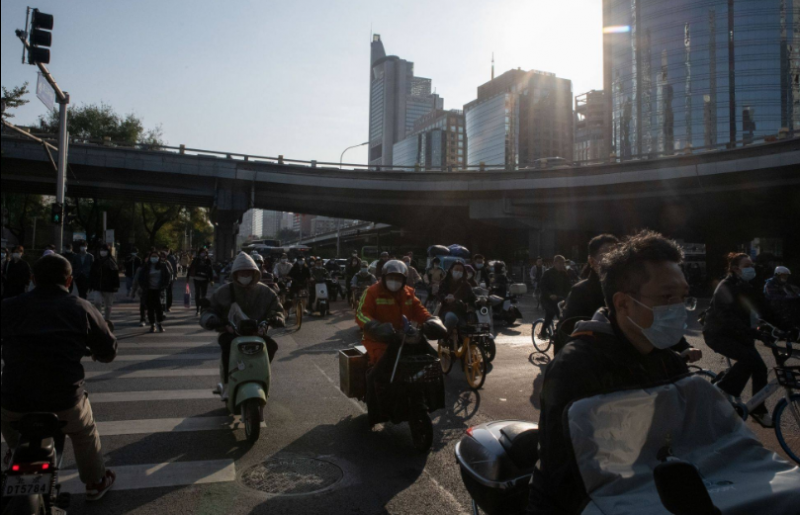
Beijing: A senior International Monetary Fund (IMF) official said on Wednesday that China should look at lowering interest rates and providing more financial support to vulnerable households.
Because the nation needs a strong domestic reform next year to counteract the deteriorating external environment.
According to Gita Gopinath, the Washington-based organization's first deputy managing director, the nation needs to "recalibrate" its zero-Covid strategy to get the world's second-largest economy back on track, while relying on market reforms for growth. Is. Providing productivity and medium and long term growth.
The recommendations come as the IMF releases the findings of its annual assessment of the Chinese economy and financial system, which was conducted in early November as part of the Article Four Consultative Mechanism.
Also Read: Economic ties between China and Canada enter a period of "cold coexistence
The IMF has identified the three biggest risks to China's economy, namely the coronavirus pandemic, a slump in the housing market and foreign demand.
Longer-term threats include rising geopolitical tensions, which could lead to financial isolation from the West, and restrictions on trade, foreign direct investment, and the exchange of knowledge related to technology.
Gopinath told the South China Morning Post in an interview upon publication of Article Four Review that China, unlike the majority of other countries, does not have an inflation issue.
"We see the role of longer-term policy being accommodative, and this could come through a cut in interest rates, noting that these next months need to bring about a strong recovery," he added.
The authors write, "On fiscal policy, we see a need for support to help vulnerable households ... as this will help bring private consumption back."
In October, China's consumer price index was 2.1%, and in the first 10 months of the year, it was 2%. This is well below the government's annual target of 3%, unlike major Western economies plagued by inflation at 40-year highs.
Earlier this month, the IMF discussed its findings with senior Chinese government officials, the People's Bank of China, business representatives and academics.
Beijing is at a critical crossroads as most of the new Communist Party leadership will be sworn in in March and there is some uncertainty about transitional policies.
Regular virus outbreaks and stricter coronavirus control procedures are causing problems for commerce and mobility. With less external demand, the economy is already slowing down, and things could get worse.
The IMF predicted growth of 3.2% for the full year, but China's economy grew only 0.4% in the second quarter. Given that it accounts for nearly a third of global growth, the country's shaky economic recovery has wide-ranging implications.
Also Read: Australia clears the Free Trade Agreement with India
The Central Economic Work Conference in December, where China's top leadership will discuss economic and coronavirus policies as well as the 2023 development target, is an event being closely watched.
Although Chinese authorities have made significant investments in infrastructure this year, they have been wary of significant monetary easing. Instead, he has chosen lending and credit instruments to support specific industries, and in the past two weeks, he has provided new financial aid to small businesses and real estate developers.
Once this year, the policy rate for one-year medium-term credit facility was reduced by 10 basis points to 2.75 per cent in mid-August.
The five-year loan prime rate, a market benchmark linked to mortgage rates, has been cut three times to 4.3 percent, for a total of 35 basis points. In our opinion, this accommodative stance should continue, with greater emphasis on lowering interest rates than on directing credit."
Aggressive US monetary tightening, which has already put tremendous pressure on international capital flows and the value of the yuan, is a significant obstacle to China's policy easing.
In early November, the Chinese yuan fell in value to 7.2555 per US dollar, a level not seen in nearly 14 years. Since fluctuations in currencies are caused by fundamental differences, he said, "we believe that allowing exchange rate flexibility is a good way to deal with spillovers."
According to the IMF official, structural and liquidity issues resulting from China's real estate market crisis have largely stalled investments.
"If we don't see a recovery in asset sales or a recovery in investments, there is another downside risk," Gopinath said. "This could then impact the wider economy more than ever."
In contrast to Beijing's proactive approach, the IMF advocated for "neutral" fiscal policy to support recovery and aid in rebalancing. It claimed that strengthening the social safety net in particular will benefit households and more effectively support growth.
Gopinath asserted that market-based structural reforms were required to address long-term challenges such as an ageing population, a declining workforce, and low productivity growth.
These included greater investments in education, a postponement of China's retirement age, and competitive neutrality between state-owned enterprises and private businesses.
Also Read: Film Industry: Anurag Thakur says film industry is creative economy
In order to strike a balance between economic growth and the preservation of lives and health, Gopinath suggested that Beijing increase vaccination rates, particularly among the elderly.